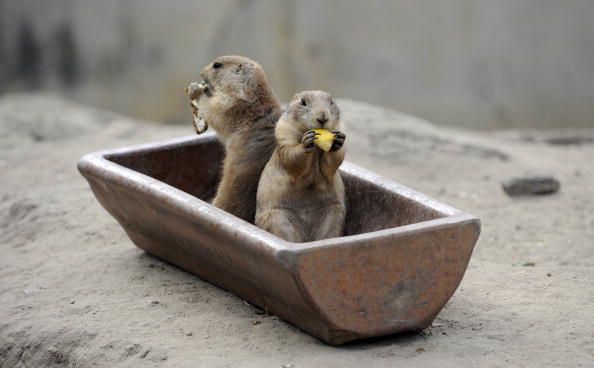
Turns out, it's not just human couples that suffer when one partner drinks significantly more than the other. New research reveals that unequal drinking also takes it toll on prairie vole couples, which suggests the fascinating conclusion that the correlation between alcohol and failed relationships may be a biological one.
Not many mammals practice long-term monogamy, and just one known species of rodent does. That rodent is the prairie vole, and it also happens to be the only rodent known to freely consume alcohol. Mice and rats hate it; prairie voles, for whatever reason, are natural-born drinkers.
"They maintain the same pair bond for their entire lives," Andrey Ryabinin of Oregon Health and Science University told New Scientist, before explaining that prairie voles actually prefer alcohol to water.
What drunk prairie vole can tell us about social attachment in males and females consuming alcohol http://t.co/q3FuLqGTiH
— Smithsonian Magazine (@SmithsonianMag) April 8, 2014
Prior research conducted by Ryabinin and others demonstrated alcohol could affect the voles' relationships. It would appear that male voles who drink heavily are more likely to cheat compared to voles who are more moderate. When female voles were the heavy drinkers, though, they were more likely to stick with their partner.
Ryabinin wanted to observe the effect in human relationships, but instructing humans to drink catastrophically is not super ethical. Fortunately, human and prairie vole relationships have a lot of commonalities. Like humans (at least in theory) both vole partners share the responsibility of raising their offspring. And, according to an earlier, unrelated paper in Science, prairie voles are also capable of empathy, and comfort each other in times of need.
The researchers gave different pairs of voles either only water or both alcohol and water; in some, only the males were given the alcohol option. The prairie vole couples were then allowed to mate, and subsequently kept together for a week. Then they were later separated with mesh (so they could still pick up each other's scent and generally communicate). Monitoring their interactions revealed that males voles remained committed when their partner had consumed a similar amount of alcohol. But if the female remained sober, the male became much more likely to take up with a stranger. Ryabinin will present the findings this month at the annual meeting of the Society for Neuroscience in Washington, DC.
"We still need to take the human factors into account," Rabinin told New Scientist. "But now we have identified that biology plays a role, and can study that."
Uncommon Knowledge
Newsweek is committed to challenging conventional wisdom and finding connections in the search for common ground.
Newsweek is committed to challenging conventional wisdom and finding connections in the search for common ground.
About the writer
Kastalia Medrano is a Manhattan-based journalist whose writing has appeared at outlets like Pacific Standard, VICE, National Geographic, the Paris Review Daily, ... Read more
To read how Newsweek uses AI as a newsroom tool, Click here.








